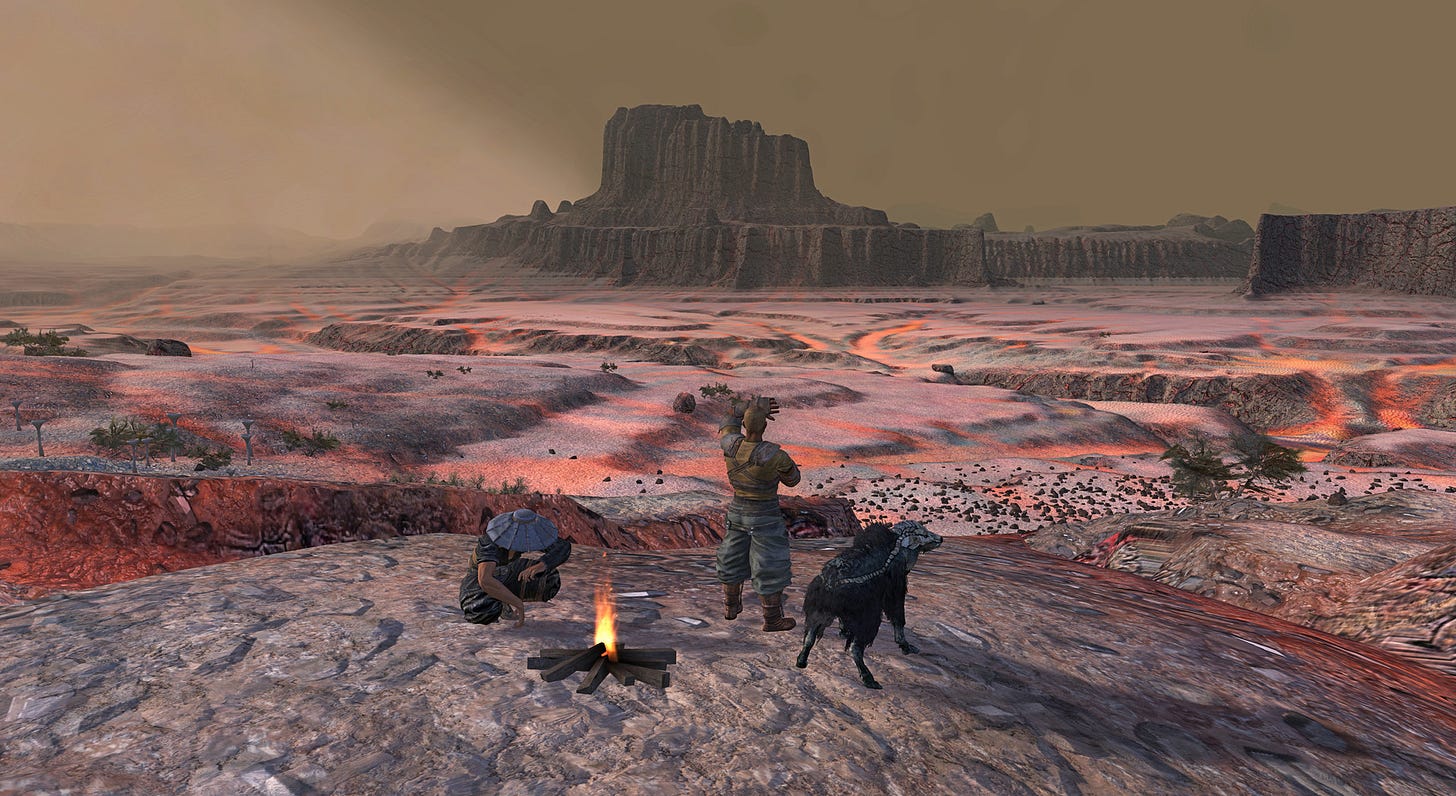Emergent narratives and indiegames
How lack of funds and time can stimulate creativity
Hi everyone! I’m Lorenzo, alas Lukather, and this is a new issue of the renowned Lukather’s Trove newsletter.
The idea behind the newsletter was to create a sort of curated list of indie games to help you untangle the endless sea of games coming out on the various platforms (but especially on Steam and Itchio). As you know, appetite comes with eating, so I started thinking about how to broaden the horizons of the newsletter by embracing other avenues, always clearly related to indie games and their development.
In today’s issue, I would love to talk about Emergent narratives in video games and indiegames. This is the essay.
Emergent Narratives and Indie Games
Emergent narratives are a fascinating aspect of video games that have become increasingly popular in recent years. These narratives arise from the player's actions within the game, resulting in a unique, player-driven story. Indie games, which are developed by small teams or individuals without the backing of a major publisher, have become a hotbed for emergent narratives. In this essay, we will explore how indie games have become a breeding ground for emergent narratives.
Emergent Narratives in Indie Games
Indie games have always been known for their creative and innovative approach to game design. Because they are not beholden to the expectations of big publishers, indie developers have the freedom to experiment with different game mechanics and storytelling techniques. Emergent narratives are a perfect example of this experimentation.
Games like "Minecraft" and "Stardew Valley" have become famous for their emergent narratives. In "Minecraft," players are given the freedom to explore, build, and create whatever they want. As a result, players often end up creating their own stories within the game. In "Stardew Valley," players take on the role of a farmer, managing their own farm and interacting with the game's various NPCs. The game's open-ended nature allows players to develop their own relationships with these characters, resulting in unique and often emotional stories.

The Appeal of Emergent Narratives
Emergent narratives are appealing to players for several reasons. First, they offer a level of player agency that traditional, linear narratives cannot. Players feel like they are in control of the story, and that their choices matter. Second, emergent narratives often feel more authentic and personal than pre-written stories. Because they arise from the player's actions, emergent narratives feel like they belong to the player, rather than the game's developers.
Players can engage with narrative as an emergent experience that happens while the game is played: Jak and Daxter’s story arises through the play of the game.
Rules of Play: Game Design Fundamentals
The Role of Technology in Emergent Narratives
Technology has played a significant role in the emergence of these player-driven stories. With advancements such as procedural generation and artificial intelligence, game developers can create more complex and dynamic game environments that allow for emergent narratives to occur. Procedural generation, for example, allows for the creation of vast and diverse game worlds that players can explore and shape in unique ways.
Artificial intelligence has also been used to create more realistic and responsive non-playable characters (NPCs) that players can interact with. This can lead to more complex and nuanced emergent narratives as players develop relationships with these characters and make decisions that affect their behaviour within the game.
The Importance of Player Choice in Emergent Narratives
One of the key features of emergent narratives is the level of player choice and agency they offer. Players are free to explore and interact with the game world in their own way, and their actions have a direct impact on the story that unfolds. This level of player choice is essential to creating truly unique and personal emergent narratives.
However, it is also important for developers to strike a balance between player agency and narrative structure. Too much player freedom can result in a disjointed and unfocused story, while too little can make the game feel too restrictive. Finding the right balance is essential to creating a compelling and engaging emergent narrative experience.
The Future of Emergent Narratives in Gaming
As technology continues to advance and indie games continue to grow in popularity, we can expect to see even more innovative and exciting emergent narratives in gaming. With the rise of virtual reality and augmented reality, game developers will have even more tools at their disposal to create immersive and dynamic game worlds that allow for emergent narratives to occur.
The growth of 'survival' type games where there is often, if not always, no real ending and not even a 'story' to follow, is a clear sign of the players' desire to not only be part of the story but also to be able to create it, to write it. Games like V-Rising, Day-Z, Valheim, The Long Dark and the last hit Sons of the Forest are great examples of games that had an emergent narrative as the main pillar.
Overall, emergent narratives represent a significant shift in the way we think about storytelling in video games. They offer a level of player agency and personalization that traditional narratives cannot match, and they allow for truly unique and engaging storytelling experiences. As gaming continues to evolve, emergent narratives will undoubtedly play an increasingly important role in shaping the future of the industry.
Kenshi
Kenshi is an open-world role-playing video game developed and published by Lo-Fi Games. The game has an emergent narrative that is created through the player’s actions and decisions in the game world. The game does not have a traditional story or plot but instead allows players to create their own stories through their interactions with the game world. The game is set in a post-apocalyptic world and features sandbox-style gameplay that allows players to explore and interact with the game world in any way they choose.
Some examples of emergent narrative in Kenshi include the player’s ability to create their own faction and engage in warfare with other factions, the ability to recruit and train followers to help the player character in their adventures, and the ability to build and manage a base of operations. The game also features a dynamic economy that is influenced by the player’s actions, allowing players to become traders or bandits and influence the game world in different ways.
I’ve already talked about Dwarf Fortress so let’s talk about
RimWorld
At its core, RimWorld is a colony management game where players must guide a group of stranded colonists as they strive to survive and thrive on a remote and hostile planet. The game features a rich array of gameplay mechanics, including resource gathering, base construction, farming, crafting, research, and combat. Each colonist has their own unique traits, skills, and personalities, which adds depth and complexity to the gameplay.
The real magic of RimWorld lies in its AI-driven storytelling system, known as the "AI Storyteller." This system dynamically generates events and challenges, ranging from natural disasters and raids to diseases and internal conflicts within the colony. This constant stream of surprises creates a sense of tension and urgency, making every playthrough feel fresh and unpredictable.
Project Zomboid (or CDDA)
Probably you already know about this game but maybe the thing that you don’t know is that PZ draws strong inspiration, someone would say with better graphics and UI, of a game called Cataclysm: Dark Days Ahead.
CDDA, for the friends, is an exceptional open-source roguelike survival game that offers players a vast and unforgiving post-apocalyptic world to explore.
The game features an astonishing level of detail and complexity, offering a wide range of gameplay mechanics, such as crafting, cooking, farming, vehicle construction, and combat.
One of the game's standout features is its extensive character creation and customization system. Players have the freedom to shape their survivor's skills, traits, and background, resulting in unique and personalized playthroughs. The depth of choices and consequences in CDDA is staggering, allowing players to approach survival in various ways, whether it's through stealth, brute force, or resource management.
While CDDA is really Project Zomboid features a pixelated art style that captures the bleak and desolate nature of the post-apocalyptic world. While the graphics may not be visually stunning, they effectively convey the eerie and tense atmosphere of survival amidst a zombie outbreak. The UI is intuitive and provides essential information at a glance, enhancing gameplay efficiency.
Choosing between the two depends on personal preferences, with Project Zomboid delivering a more focused and intense survival experience, while CDDA provides a deeper and broader simulation of post-apocalyptic survival.
X4 Foundations
X4 Foundations, developed by Egosoft, is an ambitious space simulation game that offers players a sprawling sandbox universe to explore, trade, and build their own empires. With its vast scope, intricate mechanics, and immersive world, X4 Foundations delivers an engaging and captivating space-faring experience.
X4 Foundations puts players in the role of a space pilot, granting them the freedom to shape their own path in a dynamic and living universe. The game offers a wide range of activities, including trading, mining, combat, exploration, and managing a fleet of ships. The sheer scale of the game world, with multiple interconnected sectors and countless star systems, provides an immense playground for players to discover and conquer.
One of the standout features of X4 Foundations is its detailed economy system. Players can participate in trade routes, establish and manage their own stations, and delve into the intricacies of supply and demand. The game's living economy ensures that every action has consequences, creating a sense of immersion and realism.
The combat in X4 Foundations is a mix of fast-paced dogfights and large-scale fleet battles. Players can pilot their ships or command AI-controlled vessels, engaging in thrilling space skirmishes. The game also allows players to board and take control of other ships, expanding their options for conquest and exploration.
The game's open-ended nature and freedom of choice allow for emergent narratives to unfold. Players can choose to become traders, pirates, mercenaries, or even explorers, each with their own unique set of challenges and opportunities. These choices can lead to unexpected encounters, alliances, and conflicts, as the game world responds dynamically to the player's actions.
X4 Foundations also incorporates emergent gameplay through its ship and fleet management mechanics. Players can build and customize their fleets, recruit and assign crew members, and engage in large-scale battles. The outcome of these battles and the survival of the fleet depend on the player's strategic decisions, ship designs, and combat tactics. The unpredictability of combat encounters and the ability to witness epic battles unfold contribute to the emergent nature of the gameplay.








